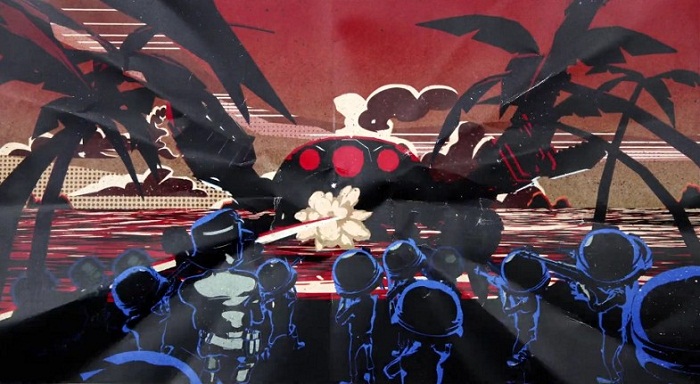Remember Boom Beach? Supercell’s globally popular mobile strategy games set in a fantasy tropical archipelago? In the game, players had to fight against an evil foe known as the Blackguard, daily, and every month they confronted the Blackguard’s gargantuan robot beast, the Mega Crab.
To celebrate the end of a year-long animation campaign for Boom Beach, Waste, an independent digital creative agency, has created a rich 3D animation film/clip for The Anniversary Crab that weaved all their previous animations into a rich underwater scene – while playing out in reverse.
Launched in late May, the film shows the giant mechanical Mega Crab being destroyed at the very beginning of the film. The rest of the film is then played out in reverse, as the giant monthly big boss sinks down onto the seabed.
Talking to Animation Xpress, Waste motion director Alex Robinson revealed, “The reverse animation symbolised the end of the cycle of the Mega Crab series. We felt it was an interesting storytelling device that immediately offered something unexpected. To round off our Mega Crab series, we decided to celebrate the videos we had created throughout the year, replaying each one in reverse in a montage.”
The animation was created using 3D Studio Max, Phoenix FD and composited in Adobe After Effects. With a tight deadline, the team worked fast- from scripting, storyboarding, wireframing and delivering the final film in seven weeks.
Robinson added, “The Anniversary Crab was a pretty amazing achievement to turn around in just seven weeks. Our 3D animator and lead motion graphics designer Chip Allcott, might be seeing water simulations for weeks to come, but the level of detail we achieved really paid off. I’m incredibly proud of the work everyone put in here at Waste the perfect end to this cycle of Mega Crabs.”
This film marks the last animation in this cycle of in-game events, and forms part of a series that has delivered a very different Mega Crab film each month, with rich animations that shows a level of stylised craft not seen before on their channels. From binaural sound design to rich 3D environments; from flat 2D illustrations to Chinese calligraphy and ink bleeds; even 8-BIT style animations, each Mega Crab film/clip depicted specific Mega Crab theme of the month.
Waste associate creative director Benny Bentham mentioned, “The Anniversary Crab gave us the ideal platform to celebrate the huge variety of art direction styles we’ve explored over the last ten months for Boom Beach. With a film that shows craft, storytelling and technical skills all working together seamlessly and adds to a rich body of work, we’re all really proud of as an agency.”
Founded 12 years ago, Waste has offices in London and Los Angeles, with 60 specialists covering strategy, creative, social/web content, advertising, digital experiential, DOOH, UX and SEO. As an agency, they believe in expertise and a no-fuss attitude and call this approach – Maximum Digital. Minimum Nonsense. Besides Robinson, Bentham and Alcott the creative team that worked on The Anniversary Crab are creative director Louis Clement and art director Stefano Perelli.
Their client list includes Supercell, Nintendo, Sega, Warner Brothers, Turner, Ubisoft, Badoo, lottery brand Camelot and media brand family Oath. The agency also provides digital leadership for energy market leaders Centrica, covering British Gas, Hive, Dyno and Direct Energy.
Being asked about how the idea came alive from script to screen, Robinson informed, “Once we had our idea, we wrote the script, developed a mood-board and defined the colour palette and mood of the film. The next phase involved creating style frames for a key scene, which we created in 3DS Max and composited in Photoshop. After that, we moved straight into storyboarding and shot selection. The storyboards are then turned into a boardomatic. This part of the process allowed us to map out the pace of the film onto a timeline using the storyboard frames that we can then pass onto the animator as a guide for the wire frame animatic. This process are vital to defining the story and making it clear to the client exactly what we are going to do. The wireframe animatic is probably the most important part of the process. The animator created all the scenes- the camera moves, the animation, with oversight from the writer, art director and motion director. Once this has been agreed, we then move into lighting each shot. Characters and backgrounds were modelled in 3D, then seamlessly merged them together. Then every frame was printed out and stop-motion animated. The paper was ripped for a handmade aesthetic – pushing the game assets in a completely different direction.”
Waste achieved the final part of the process which is compositing, through Adobe After Effects. “Using all the passed rendered from 3DS Max, we pieced the entire film together, scene by scene, like a jigsaw puzzle. This is also the stage where the water was brought to life using Trapcode Shine and bubble simulations. The water takes time to simulate, but really adds that final polish. Then we rendered it and made sure there aren’t any bugs before delivering it to the wider world,” Robinson noted.
The creative agency recreated the in-game assets with a new 1940s propaganda art direction, designing and painting elements and assets in 2D. Their brief at Waste was to excite players about the arrival of this iconic foe, so they created a cinematic, dramatic and super stylised concept that surely attracts eyeballs and fulfills its purpose.

